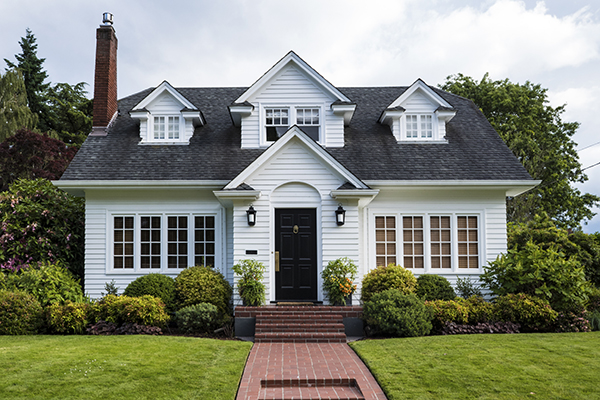Private Property

Stormwater facilities on private property are inspected at no cost to the property owner by Montgomery County DEP staff and contractors. These properties include commercial buildings, churches, community owned spaces such as HOA and COA common areas, apartment complexes and single-family residential areas. After the inspection, the property owners are notified of any items that need to be addressed. What type of maintenance the property owner is responsible for, structural or non-structural, can vary from property to property. Structural maintenance includes the manufactured components of the facility: the control structures, pipes, filters etc. Non-structural maintenance includes things such as trash removal and vegetation management.
Information By Property Type
Commercial
Commercial properties such as offices, apartment complexes, and shopping centers are responsible for both structural and non-structural maintenance. After the inspection is complete the property owner will receive a work order (PNG) indicating what work needs to be completed. The property owner is responsible for hiring a contractor from our approved contractor lists. Once the work is complete the property owner is to contact the DEP inspector designated in their work order to schedule a final inspection by DEP staff.
HOA or COA Managed
Stormwater facilities on communally owned residential areas are typically managed by the property manager employed by the HOA or COA. After the inspection is complete the property manager or designated representative will receive a work order work order (PNG) indicating what work needs to be completed. The property owner is responsible for both structural and non-structural maintenance of the facility unless they have transferred responsibility for structural maintenance only over to the county via the county’s Structural Maintenance Transfer Program. The responsibilities of each facility are outlined in the Stormwater Easement and Covenant documents. The property manager is responsible for hiring a contractor from our approved contractor lists. Once the work is complete the property owner is to contact the DEP inspector designated in their work order to schedule a final inspection by DEP staff.
Single Family Residential (SFR)
ESD facilities on Single Family Residential Properties are now required to be inspected on a triennial basis similar to ESDs on commercial properties. These facilities are usually installed by the developer at the time of construction or installed by the property owner through a program such as RainScapes. DEP inspects these facilities on a three-year rotation based on location within the county. A notice will be mailed out indicating that an inspector will be in the area in the next coming weeks. You do not need to be home for the inspection, however, if you have a fenced yard or a dog you may wish to schedule an inspection through [email protected]. The inspector will conduct the inspection and leave a postcard (PNG) on your door indicating whether the facility has passed or requires maintenance. You may also be instructed to contact the inspector for further instructions. The maintenance is voluntary at this time and your obligations are complete once the inspection is completed, however completing recommended maintenance items may help prevent future stormwater drainage problems. The DEP inspector is also available to assist with the Water Quality Protection Charge (WQPC) Tax Credit Application. Learn more about the WQPC Program
The Stormwater Facility Maintenance Program inspects stormwater facilities at least every three years in order to make sure the facilities are functioning. The inspection is used to determine a facility's condition and to identify its need for maintenance. Without proper inspections and maintenance, we would not know when a facility has failed. Once a facility fails, the cost of repairs is expensive and can result in property damage or other loss.
Property Owner Responsibilities
-
Structural Maintenance
Observe the overall structure and identify any obvious problems. Things like pipes, outfalls and concrete risers can develop structural cracks and leaks over time. They need regular maintenance to prevent future problems.
-
Non-Structural Maintenance
Is the stormwater facilities clogged by trash, debris, sediment and mud, or other stormwater pollutants? A clogged facility can prevent a structure from working properly and can compromise its structural integrity, leading to additional, more expensive repairs. Providing routine maintenance and inspections can keep the stormwater facilities working as intended, save money, property, and protect public safety. Learn more non-structural maintenance responsibilities (PDF).
-
Report any issues to DEP
By contacting 311 or [email protected]
Inspection Process
-
DEP staff conducts an inspection
Every three years DEP performs what is called a triennial inspection. These inspections are organized geographically by region within the county. When a facility is due for inspection, DEP will notify the owner or property manager by mail or email that an inspector will be in the area. On the day of the inspection the staff member or contractor will let the owner know they are on site performing the inspection.
-
Receiving a work order
If the inspector finds a facility or part of a facility has failed, a “work order” is created. This document is sent to the property owner and details what has failed and what needs to be repaired or maintained and the required timeframe in which to complete the repairs.
-
Hiring a contractor
The property owner is responsible for hiring a contractor from our approved contractor lists.
-
Performing maintenance work
See an example work order (PNG)
-
Final inspection
Once the work is complete, the property owner must contact the DEP inspector designated in their work order to schedule a final inspection by DEP staff.